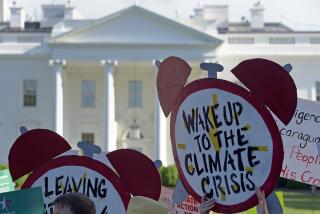Senators Urge Bush to Act on Global Warming
- Share via
WASHINGTON — Senators from both parties pressed President Bush on Tuesday to reverse the Administration’s decision not to seek an international convention to deal with the threat of global warming.
“It is not too late to act,” Sen. John H. Chafee (R-R.I.) said in a letter urging Bush to issue new instructions to U.S. delegates to an intergovernmental group scheduled to meet in Geneva today. Chafee is the ranking Republican on the Senate Environment and Public Works Committee.
Chafee said the convention proposal, which is supported by the Environmental Protection Agency and the State Department, is one of the “bold, new initiatives” that can “bolster your reputation as an environmental President.”
A separate letter, circulated by Sen. Albert Gore Jr. (D-Tenn.) and signed by 12 Democrats and one Republican, Sen. John Heinz of Pennsylvania, called the meeting a “unique opportunity” to demonstrate leadership on environmental issues and urged the Administration to join other Western economic powers in supporting a convention on global warming.
A White House spokesman said he had not seen the Chafee letter. On Monday, a spokesman confirmed that the Office of Management and Budget had altered a top National Aeronautics and Space Administration scientist’s congressional testimony on the so-called greenhouse effect, weakening its conclusion that enough is known about the phenomenon to warrant immediate action.
The White House defended the editing as an effort to avoid the appearance of policy disagreements in the Administration. The scientist, James E. Hansen, director of the Goddard Institute of Space Studies, said the changes amounted to altering scientific conclusions.
The episode is the latest stumble for an Administration already under fire for a policy-making style that critics say relies on reaction instead of direction. In the case of global warming, it also involves an issue that candidate Bush chose to distinguish himself from his predecessor. “As President,” he said during the campaign, “I intend to do something about it.”
The central problem, according to Administration officials, is that there is no consensus on what to do. The dissension surfaced last week, when White House officials rejected proposals from the EPA and State Department to use this week’s meeting in Geneva as a steppingstone to an international convention.
EPA and State Department officials envisioned a process similar to the one that led to an international protocol to reduce the use of chlorofluorocarbons, chemicals that scientists say are destroying stratospheric ozone.
More to Read
Get the L.A. Times Politics newsletter
Deeply reported insights into legislation, politics and policy from Sacramento, Washington and beyond. In your inbox twice per week.
You may occasionally receive promotional content from the Los Angeles Times.










